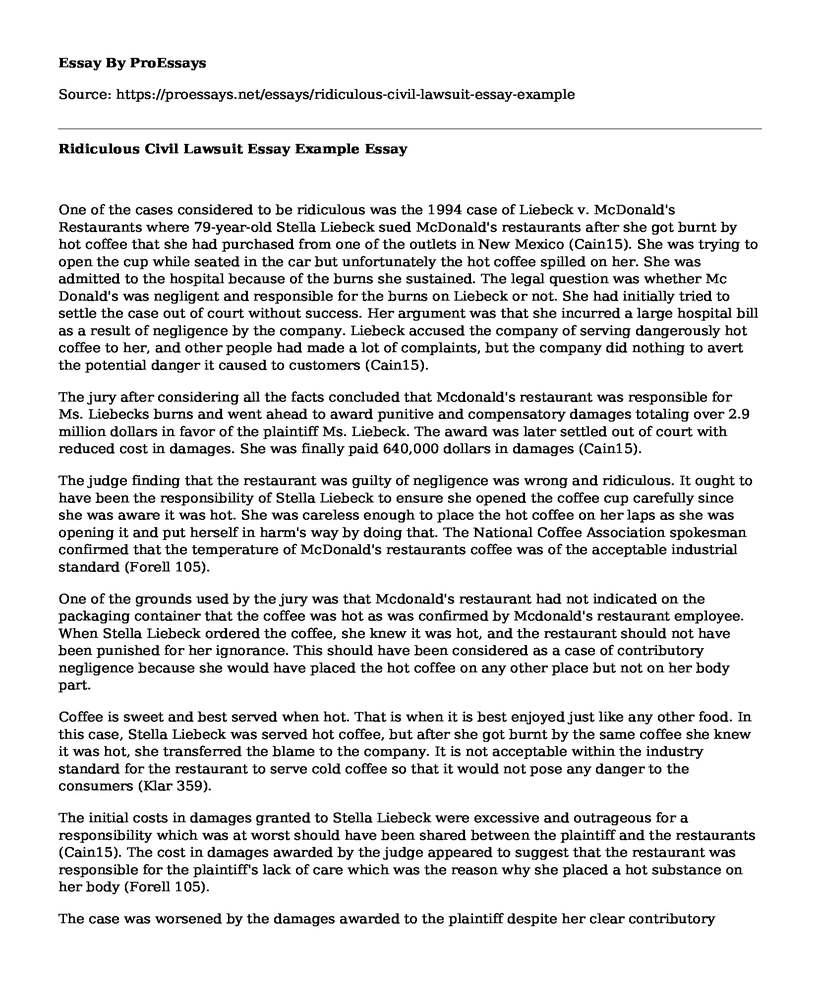One of the cases considered to be ridiculous was the 1994 case of Liebeck v. McDonald's Restaurants where 79-year-old Stella Liebeck sued McDonald's restaurants after she got burnt by hot coffee that she had purchased from one of the outlets in New Mexico (Cain15). She was trying to open the cup while seated in the car but unfortunately the hot coffee spilled on her. She was admitted to the hospital because of the burns she sustained. The legal question was whether Mc Donald's was negligent and responsible for the burns on Liebeck or not. She had initially tried to settle the case out of court without success. Her argument was that she incurred a large hospital bill as a result of negligence by the company. Liebeck accused the company of serving dangerously hot coffee to her, and other people had made a lot of complaints, but the company did nothing to avert the potential danger it caused to customers (Cain15).
The jury after considering all the facts concluded that Mcdonald's restaurant was responsible for Ms. Liebecks burns and went ahead to award punitive and compensatory damages totaling over 2.9 million dollars in favor of the plaintiff Ms. Liebeck. The award was later settled out of court with reduced cost in damages. She was finally paid 640,000 dollars in damages (Cain15).
The judge finding that the restaurant was guilty of negligence was wrong and ridiculous. It ought to have been the responsibility of Stella Liebeck to ensure she opened the coffee cup carefully since she was aware it was hot. She was careless enough to place the hot coffee on her laps as she was opening it and put herself in harm's way by doing that. The National Coffee Association spokesman confirmed that the temperature of McDonald's restaurants coffee was of the acceptable industrial standard (Forell 105).
One of the grounds used by the jury was that Mcdonald's restaurant had not indicated on the packaging container that the coffee was hot as was confirmed by Mcdonald's restaurant employee. When Stella Liebeck ordered the coffee, she knew it was hot, and the restaurant should not have been punished for her ignorance. This should have been considered as a case of contributory negligence because she would have placed the hot coffee on any other place but not on her body part.
Coffee is sweet and best served when hot. That is when it is best enjoyed just like any other food. In this case, Stella Liebeck was served hot coffee, but after she got burnt by the same coffee she knew it was hot, she transferred the blame to the company. It is not acceptable within the industry standard for the restaurant to serve cold coffee so that it would not pose any danger to the consumers (Klar 359).
The initial costs in damages granted to Stella Liebeck were excessive and outrageous for a responsibility which was at worst should have been shared between the plaintiff and the restaurants (Cain15). The cost in damages awarded by the judge appeared to suggest that the restaurant was responsible for the plaintiff's lack of care which was the reason why she placed a hot substance on her body (Forell 105).
The case was worsened by the damages awarded to the plaintiff despite her clear contributory negligence. There have been cases of ridiculous cases and awards around the world, but the courts provide mechanisms for appeal and can redeem themselves when the lower courts make unfair judgments. The case of Liebeck v. McDonald's Restaurants has been a subject of discussion and review by scholars over the years and the initial decision by the jury considered ridiculous by many.
Works Cited
Cain, Kevin G. "The McDonald's Coffee Lawsuit." Journal of Consumer & Commercial Law 11.1 (2007).
Klar, Lewis N. "The Impact of US Tort Law in Canada." Pepp. L. Rev. 38 (2010): 359.
Forell, Caroline. "McTorts: The Social and Legal Impact of McDonald's Role in Tort Suits." Loy. Consumer L. Rev. 24 (2011): 105.
Cite this page
Ridiculous Civil Lawsuit Essay Example. (2022, Aug 15). Retrieved from https://proessays.net/essays/ridiculous-civil-lawsuit-essay-example
If you are the original author of this essay and no longer wish to have it published on the ProEssays website, please click below to request its removal:
- Argumentative Essay on The Effects of Arming Teachers in Schools
- Essay Example on Social Justice Advocate: 32yo Lady Fights Oppression With Passion
- Essay Example on The Seven Five: The Story of Michael Dowd's Crimes & Redemption
- Essay Sample on Reforming Juvenile Justice in America: A 200-Year History
- My Courtroom Experience: Challenging My Timidity - Essay Sample
- Miranda v Arizona: Suspects Must be Informed of Rights - Case Study
- Article Review Example on Human Services: Improving Quality of Life







